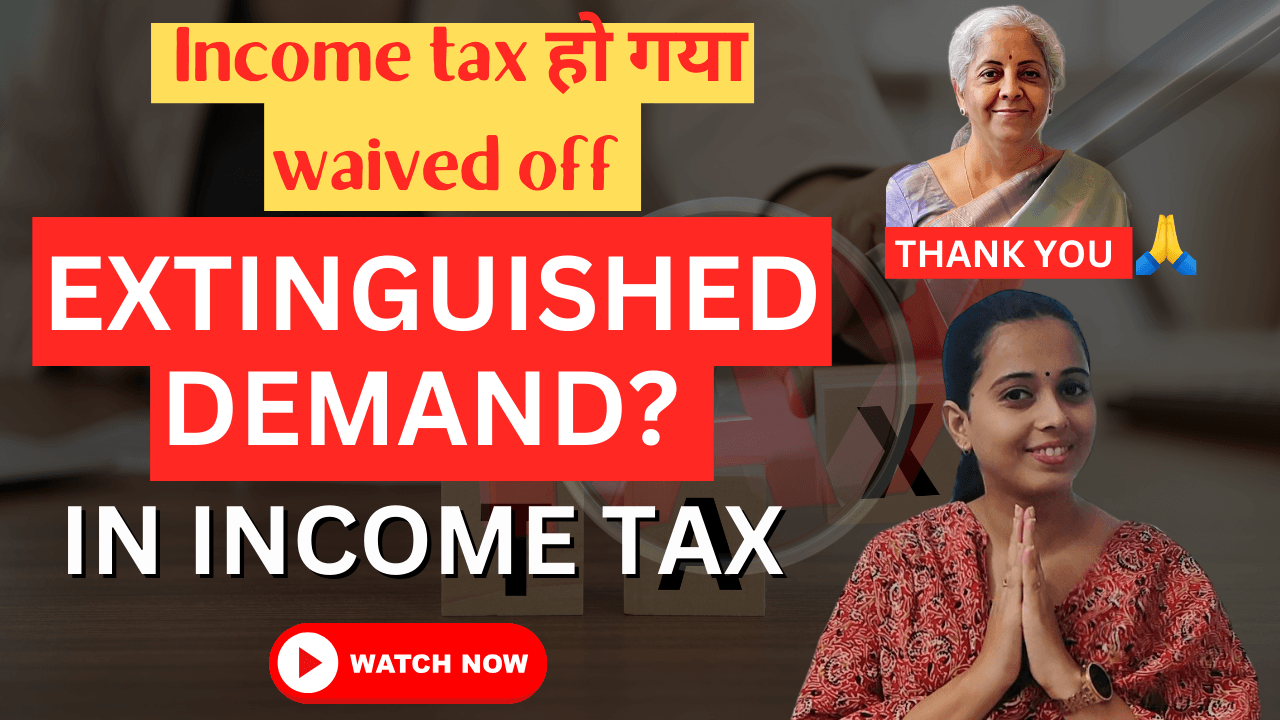What is Demand Extinguished?
When dealing with taxation, you might come across the term “Demand Extinguished.” This phrase holds significant importance in the realm of tax compliance and disputes. If you’re a taxpayer, accountant, or business owner, understanding this term can save you from unnecessary complications and penalties. This blog dives deep into what “Demand Extinguished” means, the scenarios in which it applies, and how to handle such situations effectively.
For Better Understanding watch our video – https://youtu.be/uuPswdQfKQM
What is Tax Demand?
Before understanding “Demand Extinguished,” it’s essential to grasp the concept of tax demand. Tax demand arises when the Income Tax Department determines that a taxpayer owes an additional amount beyond what was declared or paid. This could result from discrepancies in tax returns, underreported income, or mismatches in financial data.
The tax demand is raised under Section 156 of the Income Tax Act, 1961, and the taxpayer is notified through a notice or an order.
What Does “Demand Extinguished” Mean?
“Demand Extinguished” refers to a situation where an existing tax demand is considered resolved or no longer valid. In simpler terms, it means the liability no longer exists, either because it has been paid, adjusted, waived, or nullified due to legal or administrative reasons.
Common Scenarios Where Demand is Extinguished
- Full Payment of the Demand:
- When the taxpayer clears the outstanding tax demand, the liability is extinguished. Proof of payment is recorded in the taxpayer’s account, and the demand ceases to exist.
- Adjustment Against Refunds:
- If a taxpayer is eligible for a tax refund, the Income Tax Department can adjust the refund amount against the outstanding demand. Once this adjustment is made, the demand is extinguished.
- Appeal or Rectification Orders:
- If a taxpayer disputes a demand and the appellate authority or assessing officer passes an order in favor of the taxpayer, the demand is nullified.
- Time-Barred Demands:
- Under the Income Tax Act, there is a specified period within which demands can be enforced. If the demand is not acted upon within this period, it becomes time-barred and is considered extinguished.
- Settlement Under Dispute Resolution Schemes:
- Government schemes like the Vivad Se Vishwas Scheme allow taxpayers to settle disputes by paying a certain amount. Once settled, the remaining demand is extinguished.
- Clerical or Assessment Errors:
- Errors in calculations or misinterpretation of provisions during assessment can lead to invalid demands. Upon rectification under Section 154, such demands are extinguished.
How to Check and Confirm Extinguished Demand?
Taxpayers can verify the status of their tax demands using the Income Tax Department’s e-filing portal. Here’s a step-by-step guide:
- Log in to the Income Tax Portal:
- Visit https://www.incometax.gov.in and log in using your credentials.
- Navigate to “Pending Actions”:
- Under the dashboard, go to “Pending Actions” and select “Response to Outstanding Tax Demand.”
- View Outstanding Demand:
- Here, you will find details of any outstanding tax demands, including their status and whether they have been extinguished.
- Check Payment or Adjustment History:
- Confirm if the demand has been paid, adjusted against refunds, or nullified through orders.
- Download Documentation:
- Download proof of resolution, such as challans, adjustment orders, or appellate decisions, for your records.
Steps to Ensure Proper Handling of Tax Demands
- File Accurate Returns:
- Ensure your income tax returns are error-free and include all sources of income.
- Respond Promptly to Notices:
- Address tax demand notices within the stipulated time to avoid complications.
- Keep Records:
- Maintain records of tax payments, correspondence, and appellate orders.
- Seek Professional Help:
- Consult a tax professional or CA for disputes or complex demands.
- Utilize Dispute Resolution Schemes:
- Leverage government schemes for amicable settlement of disputes.
https://www.incometax.gov.in/iec/foportal/
Why is It Important to Resolve Tax Demands?
Unresolved tax demands can lead to:
- Interest and Penalties: Delay in addressing demands results in additional financial burden.
- Legal Proceedings: Persistent non-compliance may escalate into legal actions.
- Blocked Refunds: Pending demands can delay or forfeit your tax refunds.
By ensuring demands are resolved and extinguished promptly, taxpayers can maintain financial and legal peace of mind.
Conclusion
“Demand Extinguished” is a vital concept in tax compliance, signifying the resolution of outstanding liabilities. Understanding the scenarios where demands are extinguished and taking proactive steps to address tax notices can save taxpayers from unnecessary stress, penalties, and disputes.
Stay informed, file accurate returns, and consult experts when needed to ensure smooth tax compliance.
For more insights on taxation and compliance, visit our blog or subscribe to our YouTube channel Taxgyany. Have questions? Feel free to leave them in the comments section below!
https://youtu.be/uuPswdQfKQM?si=OgFv_QpeWfjlZH4j
For More Information : https://taxgyany.com/

